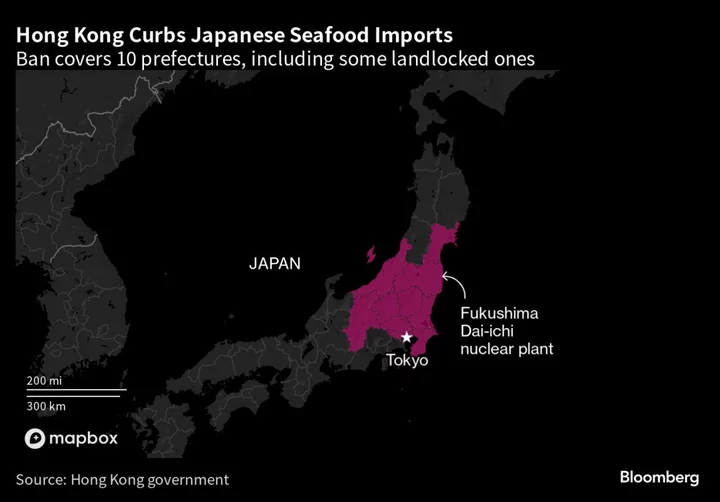Hong Kong’s restaurants are reshaping their supply chains after the government banned seafood from parts of Japan, bringing the financial hub’s curbs more in line with Beijing despite scientific reassurances the products are safe to eat.
The city will block purchases of seafood from 10 Japanese prefectures including Tokyo as the nation begins releasing treated wastewater from the wrecked Fukushima nuclear plant into the Pacific Ocean on Thursday. Violations of the ban are punishable by up to a year in jail.
Hong Kong officials say the restrictions are needed to protect food safety, echoing the mainland criticisms of Japan’s wastewater plan as “selfish and irresponsible.” Beijing already curbs Japanese food imports from those regions, which include some that are landlocked.
Japan’s marine delicacies are big business for Hong Kong, which imported some 75.5 billion yen ($520 million) of the nation’s seafood and shellfish last year. That made the city the second largest buyer after the mainland, with 87.1 billion yen of purchases.
The saga is yet another headache for the city’s restaurant industry, which is still suffering from the effects from pandemic curbs and a worker shortage. Some restaurants are now fretting about soaring import costs and potential supply delays, as they look to source ingredients for sushi, sashimi and other dishes from elsewhere in Japan or other parts of the world.
“When restaurants are scrambling to switch their suppliers, the import cost will at least be doubled,” said Eddie Oei, who owns the Japanese restaurant Lung Fu Pao in the financial district. His restaurant serves hand rolls and barbecued seafood, and sources about 40% of its ingredients from the banned prefectures.
Oei said his company is cutting dishes affected by the ban for now, as he searches for new suppliers. But even tapping supply from elsewhere in Japan poses issues, since the government plans to inspect Japanese products for radiation — a process he said will impact the freshness of ingredients.
The ban is also emblematic of how the once freewheeling financial hub is increasingly fallen in line Beijing’s diplomatic stance.
“Loyalty to Beijing has become an underlying and automatic element in Hong Kong’s decision-making process, especially if they see the issue has become an important diplomatic matter for the central government,” said Dongshu Liu, assistant professor specializing in Chinese politics at the City University of Hong Kong.
China isn’t alone in expressing concern about Japan’s wastewater discharge. South Korea’s main opposition party this week labeled the plans the “worst environmental destruction,” and denounced President Yoon Suk Yeol over his government’s backing of Japan.
Japan’s proposal does have the support of scientists, with the International Atomic Energy Agency concluding after a two-year review that the strategy would have a negligible impact on people and the environment. Japanese Prime Minister Fumio Kishida has insisted the country will meet safety standards, and that similar releases of wastewater are relatively commonplace.
Hong Kong’s ban will hurt tourism and make people question whether the city still has autonomy, said Liu, the professor.
Hong Kong officials defended their move on Wednesday, saying it was intended to protect the safety of food coming into the city. Discharging wastewater from Fukushima — the site of one of the world’s worst atomic disasters more than a decade ago — isn’t the same as releasing wastewater from functioning nuclear plants, said Lee Siu-keung, the city’s senior physicist at the Department of Health, at a press briefing.
The city said that travelers returning from the Japan with a couple of boxes of seafood for personal consumption won’t be penalized, adding that the ban is intended to curb commercial use of aquatic products, which includes “all live, frozen, chilled, dried, or otherwise preserved aquatic products, sea salt and unprocessed or processed seaweed.”
Asked at Wednesday’s briefing about how radioactive testing procedures may affect supply delivery times, authorities said testing and customs clearance for seafood will usually take a few hours. Officials also said they planned to have more meetings with the restaurant industry to ensure smooth implementation of the policy.
Several restaurants approached by Bloomberg News declined to talk about the seafood ban. The caution in publicly commenting on the negative impact of the restrictions is partly because such remarks may be seen as criticizing government policy, according to a person familiar with Hong Kong’s food and beverage industry. The person declined to share their name discussing private matters.
Some restaurant owners said they’ve already made contingency plans, given the Hong Kong government had warned it would impose the ban.
“It takes time for the price comparison and quality check, especially when the increasing demand in unaffected prefectures is tightening the distribution,” said Oei, the Lung Fu Pao owner.
--With assistance from Jane Pong, James Mayger, Rebecca Choong Wilkins and Hallie Gu.
Author: Ka Ho Cheuk, Kari Lindberg and Linda Lew

